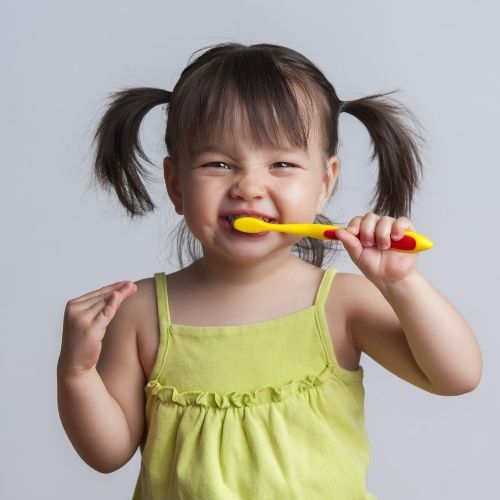Caring for Your Children's Teeth

We were lucky enough to have a chat with Dr Saul Konviser from Montagu Dental recently to share his top tips for children's dental health, as well as answer your questions. Thanks Saul!
What are your top tips for toothbrushing?
Even as a dentist, I find it very difficult to brush my children’s teeth! The main thing is we don’t want them to be traumatised by forcing it, but you want to be brushing their teeth from the second their first tooth comes out. Forget about brushing for 2 minutes as that makes it too stressful for a parent and the kids, so, aim for 3-5 seconds per tooth and that’s great. We need to make it as fun an experience as possible; you can get them to brush your teeth, create some healthy competition and see who can brush their teeth best – things like that can really help.
When does a first tooth come out?
The vast majority of children get their lower tooth first from around 6 months and the process then continues until two and a half. But don’t panic if they don’t have a tooth by the time they’re 9 months, it’s totally normal! However, if you are worried then speak to your dentist. There can be other things going on apart from teething before this as it’s easy to blame everything on that, although generally you can tell when it is teething. It’s essentially like an open wound in their mouth when the teeth first starts breaking through, so bacteria gets in and the gums get really inflamed, they can get a runny tummy, you’ll see lots of drooling, the dribbling is really important to note as they can also get rashes around their chin, which adds an extra layer of discomfort! Red cheeks are a classic sign too, and when it seems like teething is causing them issues you can treat with Calpol and just keeping the area really clean, applying salt water can help too.
When that first tooth does pop out, make sure you get some age-appropriate fluoride on there to protect against tooth decay, you want to be thinking that under the age of 3 years old you need about a grain of rice amount of toothpaste. This is why it’s so important to be brushing teeth last thing at night even after baby’s had a bottle, which I realise can be difficult, but you don’t want to milk sitting on the teeth overnight without that protection.
When should I take my child to the dentist?
The recommendation is all children should be taken to see a dentist by the age of 1 or before the first tooth comes out. Obviously a 6-month-old with one tooth won’t do a lot in the chair, but the point is to get them used to it and for the parents to be able to ask any questions they may have. I also have to tell parents not to threaten their child with the dentist as that causes fear!
How do you keep children’s teeth healthy?
The number one thing I would say is to keep sugar intake down as this is the biggest problem I see in children’s teeth, especially since lockdown. And it’s not just the amount of sugar per day, it’s the frequency of it that is a bigger issue. If you think about their day; breakfast cereals tend to have some sugar in, then they have their morning snack a couple of hours later, then maybe some form of sugar in their lunch, then fruit as a snack which although it’s natural sugar, it is still sugar! Then dinner…when you break it down, there could be sugar on a child’s tooth for the majority of the day! So if you can just focus on breakfast, lunch and dinner and keep snacks sugar-free, that would really help. Many parents are aware of a healthy diet so give lots of fresh fruit but alongside the sugar, this can also be acidic, and we actually see quite a few children with acid erosion on their teeth from fruit alone. My biggest no-no is fizzy drinks, which is not only terrible for the teeth but also on so many other health levels for a child – even if they are sugar-free!
If you notice even the smallest spot of decay on your child’s tooth then make sure you speak to your dentist as soon as you can, as even the smallest amount can spread and then lead to extraction and, unfortunately, I’ve seen a lot of that in the last year with lockdown.
What kind of toothbrush should I use?
Personally, I find that electric toothbrushes are better for 6 or 7 years old as they’re a bit more tolerant of a vibration in the mouth. Any younger and they seem like a bit of a gimmick, it gets them into it which is great thing and makes it fun, but the heads aren’t quite the right size. By all means if it gets them to start brushing then go for it, but I recommend parents should be supporting them with the right size brush. From around 2 years old it does get slightly easier as their mouth is less sensitive to teething and they understand it a bit more, but even if they now want to brush their teeth you should still be doing it for them or at least supervising them up until around 6 years old.
My child has fallen over and knocked their baby teeth – what should I do
This is so common and nothing to worry about but do go to your dentist as soon as you can. More often than not, a tiny little chip is nothing to worry about, but there is a protocol we need to follow as we need to keep an eye on it to check it doesn’t impact the adult tooth developing under the gum. We tend to then review after 1 month, 3 months and 6 months, and usually it’s absolutely fine.
My child’s big teeth have come out discoloured, what can cause this?
As mentioned above, trauma can cause this, but there are a number of other things that can cause discolouration in teeth. Genetics is one thing, it can also come from mum being ill during the second or third trimester as this is when those teeth are developing in the gums, even antibiotics in labour can cause that. Illness and antibiotics in a child in the first year of life can also cause slight discolouration while they are developing. Many children have tiny little spots on a tooth which can go away, but sometimes they stay there and can be quite visible.
How much does thumb-sucking and dummy use affect a child’s teeth?
We want to try and stop dummies by the age of 1 as they just form really bad habits, and thumb or finger-sucking we need to stop that by age 3 or 4. There are a number of variables from the pressure they put on the thumb or dummy, to the length of time they have it and the way they are sucking, but they can cause big issues in the way the teeth develop and can even affect speech. I totally get it, especially with thumb-sucking which can be really hard to stop! You’re much more likely to need some sort or orthodontic treatment in the future if you have had a dummy or have been a thumb-sucker.
Are supplements important for children’s dental health?
Yes, absolutely. Vitamin D and Calcium are crucial to bone health and, especially with everything going on at the moment, we have seen the benefits of Vitamin D supplementation in children. Just make sure whatever you use isn’t full of sugar!
Dr Saul can be found on Instagram @DrSaulKonviser
For more on Baba West Vitamin D supplements head to our page here



